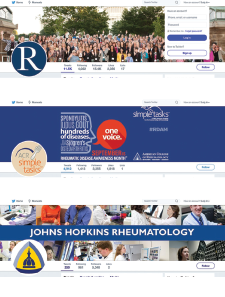Like many physicians, Dr. Worthing also keeps his personal and professional social media accounts separate.
“Twitter is the main social media tool that I use professionally,” he says. “I think sharing our voices also serves to advance our practice.”
‘Because of my involvement in #RheumJC, I’ve been able to curate a great group of colleagues who alert me to important new papers and share relevant news,’ Dr. Sufka says.
Using Social Media to Empower Patients
Rubaiya Mallay, MD, a rheumatologist at Suncoast Internal Medical Consultants in Largo, Fla., says she uses social media for networking, patient education and to enhance her own education.
“I’ve found social media is particularly beneficial in helping patients with chronic diseases, and I use it daily to help patients with personal health-related goals, such as weight management or stress,” Dr. Mallay says. “I encourage patients to use trackers (e.g., Fitbit), and MyFitnessPal and WeightWatchers are good for patients who want to exercise or lose weight and need a way to track progress. Pinterest and Snapchat are also good sites for info on physical therapy or exercise regimens.”
Dr. Mallay says she prefers patients use evidence-based medicine from quality websites than rely on anecdotal reports from friends and neighbors. “I often recommend patients visit such sites as rheumatology.org or lupus.org, where patients can join virtual communities, participate in research and receive proper information,” Dr. Mallay says.
For professional networking, Dr. Mallay uses Doximity and LinkedIn, and has also used Cleveland Clinic CME, RheumNow with Jack Cush, MD, MedScape and YouTube to utilize podcasts, conferences, CMEs and webinars.
Linda Childers is a health writer located in the San Francisco Bay area.
Using Twitter to Stay Current on News & Literature
 Looking to find the latest news on research studies, information on conferences, or potential policy solutions? Having a Twitter account will bring this news right to your feed. Some Twitter accounts to consider following @ACRheum, video abstracts, articles and info on how to register for upcoming modules.
Looking to find the latest news on research studies, information on conferences, or potential policy solutions? Having a Twitter account will bring this news right to your feed. Some Twitter accounts to consider following @ACRheum, video abstracts, articles and info on how to register for upcoming modules.
@ACRSimpleTasks, a public awareness campaign from the ACR, offers information about rheumatic diseases and the role of rheumatologists, holds a #RheumChat that is a great resource for patients who could benefit from an online arthritis support group.
@jhrheumatology, a recent post offered a video link to common questions rheumatic disease patients have about the flu vaccine.
Rheumatologists can find articles related to their specific interests by searching Twitter hashtags, such as #kneereplacement, #pain and #arthritis.

